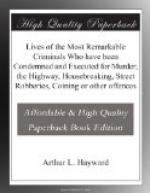In a word, all the criminals who were at this time under sentence (excepting Cliff) seemed perfectly disposed to make a just use of that time which the peculiar clemency of the English Law affords to malefactors, that they may make their peace with God, and by their sufferings under the hands of men, prevent eternal condemnation. They expressed, also, a great satisfaction that their crimes were of an ordinary kind and occasioned no staring and whispering when they came to chapel, a thing they were very much afraid of, inasmuch as it would have hindered their devotions, and discomposed the frame of their minds.
At the same time with Price, there lay under condemnation one Woolridge, who was convicted for entering the house of Elizabeth Fell, in the night time, with a felonious intent to take away the goods of Daniel Brooks; but it seems he was apprehended before he could so much as open the chest he had designed to rob. The thieves in Newgate usually take upon them to be very learned in the Law, especially in respect to what relates to evidence, and they had persuaded this unhappy man that no evidence which could be produced against him would affect his life. There is no doubt, but his conviction came therefore upon him with greater surprise, and certain it is that such practices are of the utmost ill consequence to those unhappy malefactors. However, when he found that death was inevitable, by degrees he began to reconcile himself thereto; and as he happened to be the only one amongst the criminals who could read, so with great diligence he applied himself to supply that deficiency in his fellow-prisoners. Even after he was seized with sickness, which brought him exceedingly low, he ceased not to strive against the weakness of the body, that he might do good to his fellow-convicts.
In a word, no temptation to drink, nor the desire of pleasing those who vend it[70], circumstances which too often induce others in that condition to be guilty of strange enormities, ever had force enough to obtrude on them more than was necessary to support life, and to keep up such a supply of spirits as enabled them to perform their duties; from whence it happened that the approach of death did not affect them with any extraordinary fear, but both suffered with resignation on the same day with the former criminals at Tyburn.
FOOTNOTES:
[69] See page 230.
[70] The gaolers and others in prisons
had an interest in
furnishing
prisoners with liquor and not only looked askance at
those
who refused but made it highly uncomfortable for all
who
avoided
debauchery.
The Life of FOSTER SNOW, a Murderer




